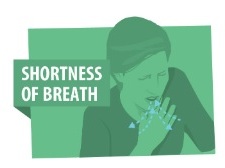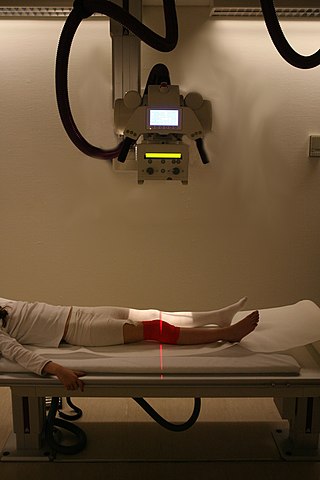Related Research Articles
Alternative medicine is any practice that aims to achieve the healing effects of medicine despite lacking biological plausibility, testability, repeatability or evidence of effectiveness. Unlike modern medicine, which employs the scientific method to test plausible therapies by way of responsible and ethical clinical trials, producing repeatable evidence of either effect or of no effect, alternative therapies reside outside of medical science and do not originate from using the scientific method, but instead rely on testimonials, anecdotes, religion, tradition, superstition, belief in supernatural "energies", pseudoscience, errors in reasoning, propaganda, fraud, or other unscientific sources. Frequently used terms for relevant practices are New Age medicine, pseudo-medicine, unorthodox medicine, holistic medicine, fringe medicine, and unconventional medicine, with little distinction from quackery.

A disease is a particular abnormal condition that adversely affects the structure or function of all or part of an organism and is not immediately due to any external injury. Diseases are often known to be medical conditions that are associated with specific signs and symptoms. A disease may be caused by external factors such as pathogens or by internal dysfunctions. For example, internal dysfunctions of the immune system can produce a variety of different diseases, including various forms of immunodeficiency, hypersensitivity, allergies, and autoimmune disorders.

Iridology is an alternative medicine technique whose proponents claim that patterns, colors, and other characteristics of the iris can be examined to determine information about a patient's systemic health. Practitioners match their observations to iris charts, which divide the iris into zones that correspond to specific parts of the human body. Iridologists see the eyes as "windows" into the body's state of health.
In common usage and medicine, health, according to the World Health Organization, is "a state of complete physical, mental and social well-being and not merely the absence of disease and infirmity". A variety of definitions have been used for different purposes over time. Health can be promoted by encouraging healthful activities, such as regular physical exercise and adequate sleep, and by reducing or avoiding unhealthful activities or situations, such as smoking or excessive stress. Some factors affecting health are due to individual choices, such as whether to engage in a high-risk behavior, while others are due to structural causes, such as whether the society is arranged in a way that makes it easier or harder for people to get necessary healthcare services. Still, other factors are beyond both individual and group choices, such as genetic disorders.

Shortness of breath (SOB), also medically known as dyspnea or dyspnoea, is an uncomfortable feeling of not being able to breathe well enough. The American Thoracic Society defines it as "a subjective experience of breathing discomfort that consists of qualitatively distinct sensations that vary in intensity", and recommends evaluating dyspnea by assessing the intensity of its distinct sensations, the degree of distress and discomfort involved, and its burden or impact on the patient's activities of daily living. Distinct sensations include effort/work to breathe, chest tightness or pain, and "air hunger". The tripod position is often assumed to be a sign.
Terminal illness or end-stage disease is a disease that cannot be cured or adequately treated and is expected to result in the death of the patient. This term is more commonly used for progressive diseases such as cancer, dementia or advanced heart disease than for injury. In popular use, it indicates a disease that will progress until death with near absolute certainty, regardless of treatment. A patient who has such an illness may be referred to as a terminal patient, terminally ill or simply as being terminal. There is no standardized life expectancy for a patient to be considered terminal, although it is generally months or less. Life expectancy for terminal patients is a rough estimate given by the physician based on previous data and does not always reflect true longevity. An illness which is lifelong but not fatal is a chronic condition.
Prognosis is a medical term for predicting the likelihood or expected development of a disease, including whether the signs and symptoms will improve or worsen or remain stable over time; expectations of quality of life, such as the ability to carry out daily activities; the potential for complications and associated health issues; and the likelihood of survival. A prognosis is made on the basis of the normal course of the diagnosed disease, the individual's physical and mental condition, the available treatments, and additional factors. A complete prognosis includes the expected duration, function, and description of the course of the disease, such as progressive decline, intermittent crisis, or sudden, unpredictable crisis.
Clinical endpoints or clinical outcomes are outcome measures referring to occurrence of disease, symptom, sign or laboratory abnormality constituting a target outcome in clinical research trials. The term may also refer to any disease or sign that strongly motivates withdrawal of an individual or entity from the trial, then often termed a humane (clinical) endpoint.
Clinical study design is the formulation of trials and experiments, as well as observational studies in medical, clinical and other types of research involving human beings. The goal of a clinical study is to assess the safety, efficacy, and / or the mechanism of action of an investigational medicinal product (IMP) or procedure, or new drug or device that is in development, but potentially not yet approved by a health authority. It can also be to investigate a drug, device or procedure that has already been approved but is still in need of further investigation, typically with respect to long-term effects or cost-effectiveness.
Symptomatic treatment, supportive care, supportive therapy, or palliative treatment is any medical therapy of a disease that only affects its symptoms, not the underlying cause. It is usually aimed at reducing the signs and symptoms for the comfort and well-being of the patient, but it also may be useful in reducing organic consequences and sequelae of these signs and symptoms of the disease. In many diseases, even in those whose etiologies are known, symptomatic treatment is the only treatment available so far. For more detail, see supportive therapy. For conditions like cancer, arthritis, neuropathy, tendinopathy, and injury, it can be useful to distinguish treatments that are supportive/palliative and cannot alter the natural history of the disease.
A chronic condition is a health condition or disease that is persistent or otherwise long-lasting in its effects or a disease that comes with time. The term chronic is often applied when the course of the disease lasts for more than three months. Common chronic diseases include diabetes, functional gastrointestinal disorder, eczema, arthritis, asthma, chronic obstructive pulmonary disease, autoimmune diseases, genetic disorders and some viral diseases such as hepatitis C and acquired immunodeficiency syndrome. An illness which is lifelong because it ends in death is a terminal illness. It is possible and not unexpected for an illness to change in definition from terminal to chronic. Diabetes and HIV for example were once terminal yet are now considered chronic due to the availability of insulin for diabetics and daily drug treatment for individuals with HIV which allow these individuals to live while managing symptoms.

Alternative cancer treatment describes any cancer treatment or practice that is not part of the conventional standard of cancer care. These include special diets and exercises, chemicals, herbs, devices, and manual procedures. Most alternative cancer treatments do not have high-quality evidence supporting their use and many have been described as fundamentally pseudoscientific. Concerns have been raised about the safety of some purported treatments and some have been found unsafe in clinical trials. Despite this, many untested and disproven treatments are used around the world.
Nosophobia, also known as disease phobia or illness anxiety disorder, is the irrational fear of contracting a disease, a type of specific phobia. Primary fears of this kind are fear of contracting HIV infection, pulmonary tuberculosis (phthisiophobia), venereal diseases, cancer (carcinophobia), heart diseases (cardiophobia), and catching the common cold or flu.

A retrospective cohort study, also called a historic cohort study, is a longitudinal cohort study used in medical and psychological research. A cohort of individuals that share a common exposure factor is compared with another group of equivalent individuals not exposed to that factor, to determine the factor's influence on the incidence of a condition such as disease or death. Retrospective cohort studies have existed for approximately as long as prospective cohort studies.
A cure is a substance or procedure that ends a medical condition, such as a medication, a surgical operation, a change in lifestyle or even a philosophical mindset that helps end a person's sufferings; or the state of being healed, or cured. The medical condition could be a disease, mental illness, genetic disorder, or simply a condition a person considers socially undesirable, such as baldness or lack of breast tissue.

Medical diagnosis is the process of determining which disease or condition explains a person's symptoms and signs. It is most often referred to as diagnosis with the medical context being implicit. The information required for diagnosis is typically collected from a history and physical examination of the person seeking medical care. Often, one or more diagnostic procedures, such as medical tests, are also done during the process. Sometimes the posthumous diagnosis is considered a kind of medical diagnosis.
A glossary of terms used in clinical research.

Placebo-controlled studies are a way of testing a medical therapy in which, in addition to a group of subjects that receives the treatment to be evaluated, a separate control group receives a sham "placebo" treatment which is specifically designed to have no real effect. Placebos are most commonly used in blinded trials, where subjects do not know whether they are receiving real or placebo treatment. Often, there is also a further "natural history" group that does not receive any treatment at all.

In general, quality of life is the perceived quality of an individual's daily life, that is, an assessment of their well-being or lack thereof. This includes all emotional, social and physical aspects of the individual's life. In health care, health-related quality of life (HRQoL) is an assessment of how the individual's well-being may be affected over time by a disease, disability or disorder.
The Skid Row Cancer Study was a study conducted by urologist Perry Hudson on the homeless men of the Bowery, in Lower Manhattan. In the 1950s and 1960s, Hudson went to skid row, to convince men to volunteer for his study. More than 1,200 men were promised a clean bed, three free square meals a day and free medical care if they were found to have prostate cancer. Hudson's early experience with seeing patients dying at a tuberculosis hospital he was working at led him to develop an interest in prostate cancer. His discovery about the lack of information regarding treatment for the disease and medical training for rectal exams needed to diagnose the disease drove him to pursue research in prostate cancer.
References
- Natural history study entry in the public domain NCI Dictionary of Cancer Terms
![]() This article incorporates public domain material from Dictionary of Cancer Terms. U.S. National Cancer Institute.
This article incorporates public domain material from Dictionary of Cancer Terms. U.S. National Cancer Institute.